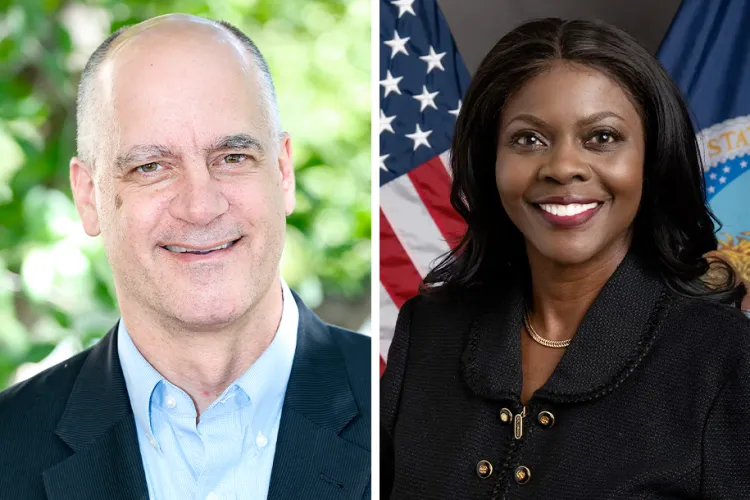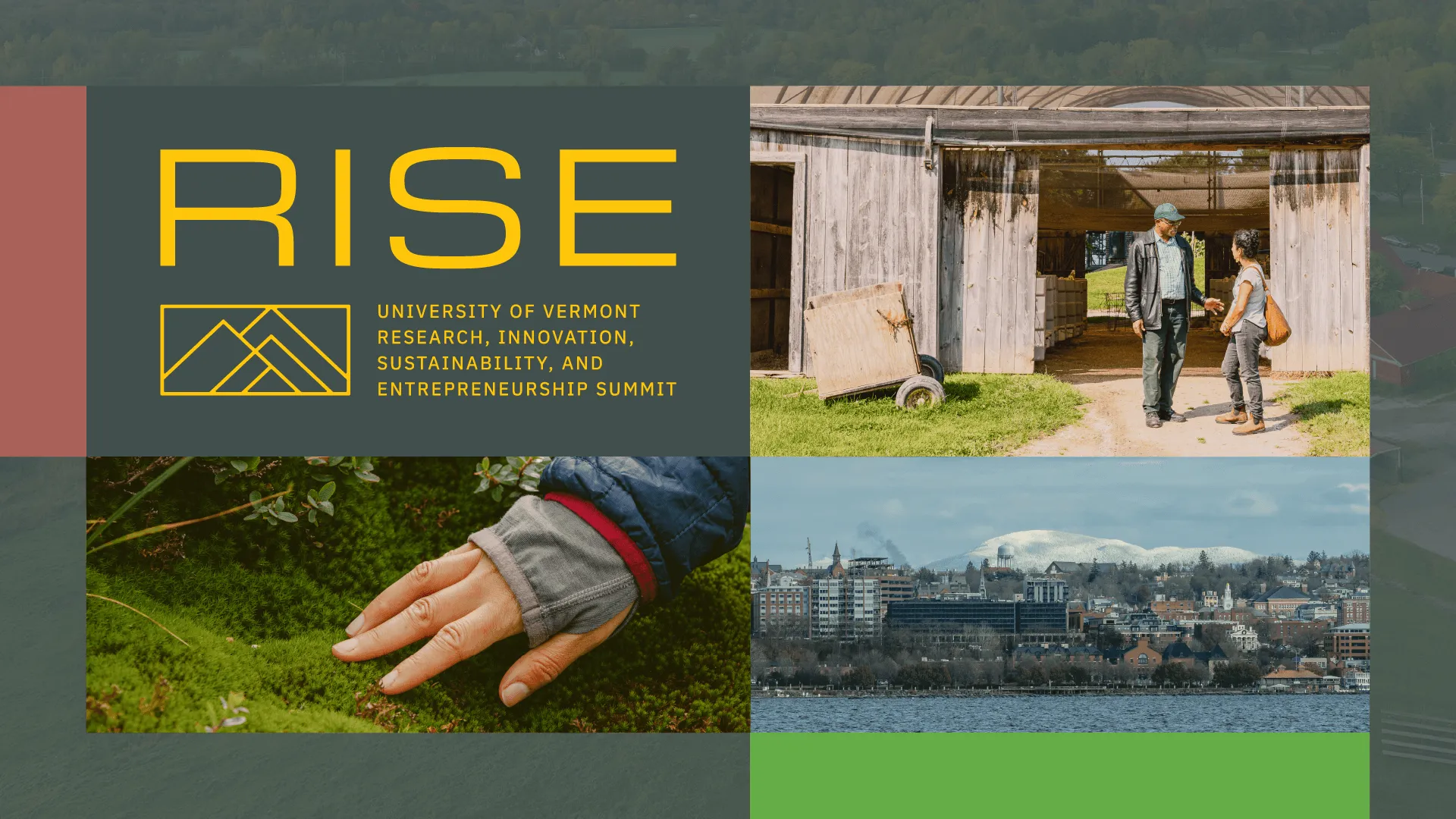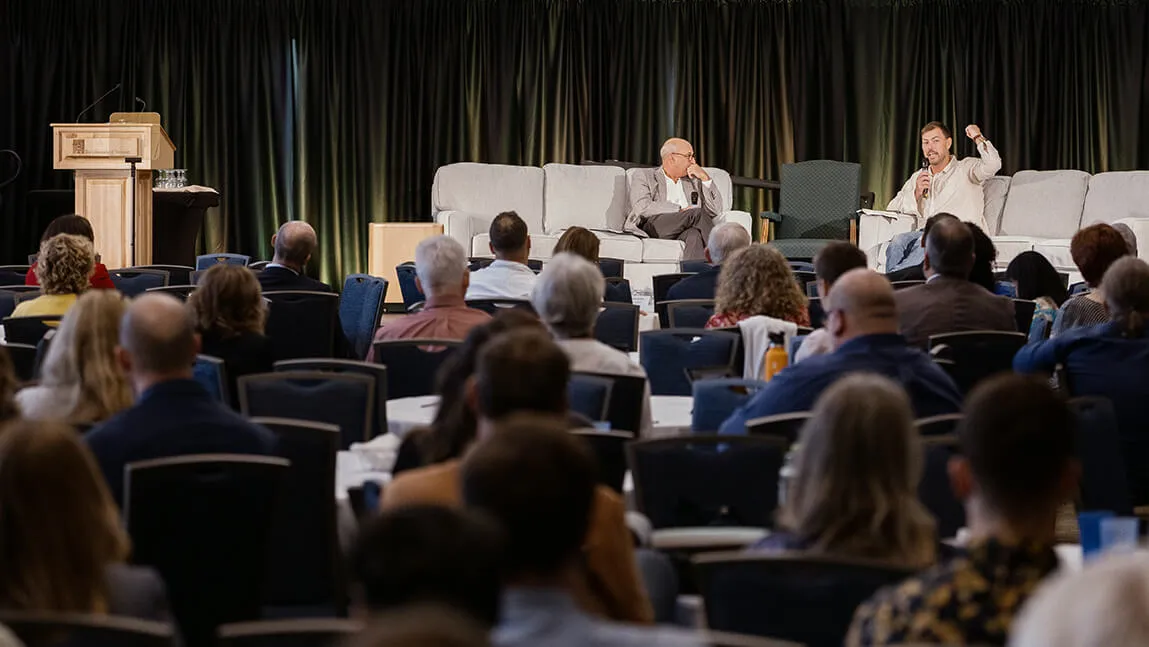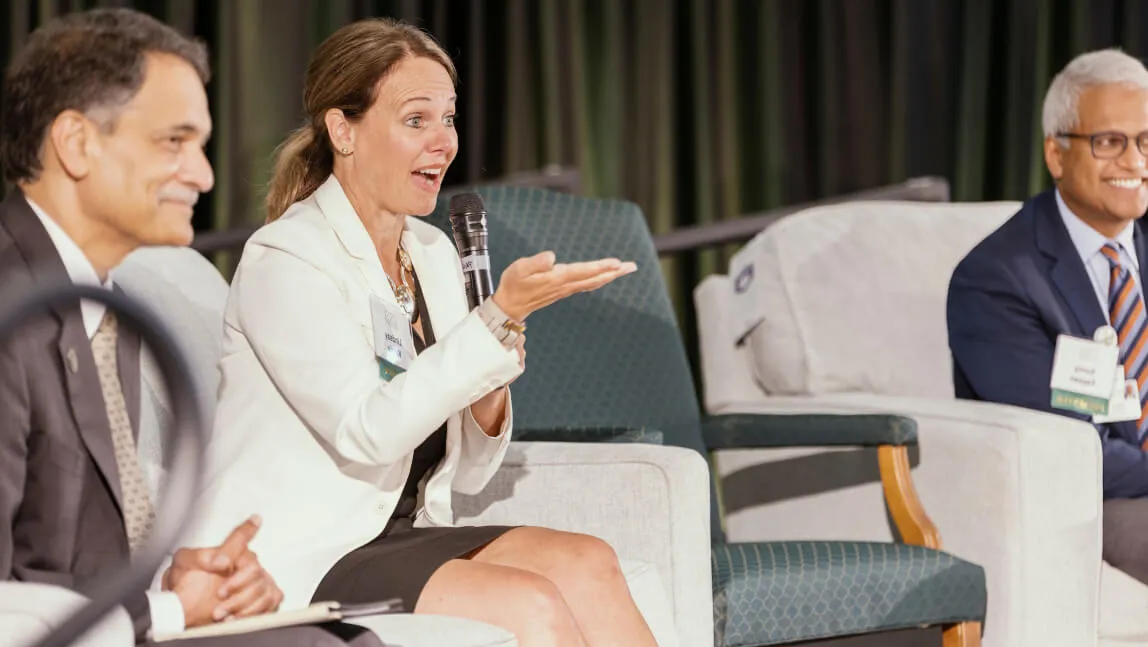This year, the Research, Innovation, Sustainability, and Entrepreneurship (RISE) Summit returns with new and returning speakers and an innovative, cohesive theme, ‘Partners in Place,’ exploring and connecting new ideas to drive place-based advances in health, prosperity, and purpose. Hundreds of the region’s entrepreneurs, business, and community development leaders will gather on June 24 and 25 to discover the possibilities and futures of truly engaging with UVM.
In 2023, the University of Vermont brought together those same stakeholders with faculty and students to introduce an intensive partnership approach to building a prosperous future for Vermont and the region. A first-of-its-kind event at UVM, the RISE Summit featured panel discussions, presentations, keynotes, performances, and more on a broad spectrum of issues and themes.
“The idea of placemaking will engage these entrepreneurs and leaders in the state and region in questions about what elements of a place they require to be innovative,” Patricia Coates, the director of the Leahy Institute for Rural Partnerships and the Office of Engagement, said. “An emerging theme in our planning with all our new and returning panelists and presenters is the essential contribution of universities — of UVM — to these placemaking efforts.”
Among the new panelists and presenters are two new speakers to UVM. On day one, June 24, Tony Pipa will deliver his keynote address, “Reimagining Rural.” Pipa, a senior fellow in the Brookings Institution’s Center for Sustainable Development and its Global Economy and Development program, launched and leads the Reimagining Rural Policy initiative, ‘which seeks to modernize and transform U.S. policy to better enable equitable and sustainable development across rural America.’ He also hosts the “Reimagine Rural” podcast, where he visits rural towns across the nation, listening to local people tell their stories, how they enact positive change in their communities, and learn how public investment in rural people and places can lead to increased and equitable prosperity.

On day two, June 25, another new speaker, Dr. Chavonda Jacobs-Young, who serves as the Under Secretary for Research, Education, and Economics (REE) and as the US Department of Agriculture’s Chief Scientist, will deliver her keynote address, “Science to Shape the Future of Our Places.” The REE’s mission area consists of over 8500 employees with a $4 billion budget, advancing agricultural research, innovation, data, and Extension across a full range of agricultural issues including climate-smart agriculture, nutrition security, equity, and strengthening food supply chains. As the USDA’s Chief Scientist, Dr. Jacobs-Young advises the Secretary of Agriculture and other senior officials on scientific matters and chairs the USDA Science Council, which convenes all parts of USDA’s scientific enterprise.
Including these two new and national speakers, the 2024 RISE summit delivers on on its placemaking theme with panels and presentations featuring local speakers and panelists. Dr. Rachael Floreani, associate professor in UVM’s College of Engineering and Mathematical Sciences will be part of the panel presentation, “How Can a Place Inspire Innovation?” with Mieko Ozeki, director of Vermont Womenpreneurs and Radiance Studios, LLC, Monique Priestly, founder and executive director of Space on Main, and Michele Bailey, a senior program manager on the Vermont Arts Council.
Tracy Dolan, director of Vermont’s State Refugee Office, will facilitate a panel, “Rural Renewal through Resettlement,” with Joe Wiah, Director of the Ethiopian Community Development Council of Vermont, Yacouba Jacob Bogre, Executive Director of AALV, Inc., and Khalil Anwari, Workforce Development Program Manager for the US Committee for Refugees and Immigrants.
A large panel discussion, “Our Places, Our Community Schools,” features several regional and state-wide leaders in education like Jason DiGiulio, EdD, Hazen Union School principal, and Jess DeCarolis, Division Director for the Vermont Agency of Education.
“If you come to RISE, you’ll hear not just the researchers, but you’ll hear the school and community leaders, you’ll hear the Agency of Education leadership talk about this work and the value that both research and the engagement our students are bringing to that project,” Coates said recently on UVM Extension’s Across the Fence. “We’re including the community because the community is very much a partner in the work that’s happening in our laboratories and our field work across the university.”
Last year at RISE, retired Senator Patrick Leahy delivered a “State of the State” address. UVM President Suresh Garimella, UVM Health Network CEO Sunny Eappen, Chatham University President Rhonda Philips, and the Vermont Secretary of Commerce and Community Development Lindsay Kurrle all took part in a panel on the importance of urban-rural development. Kyle Clark, the founder and CEO of BETA Technologies joined Vice President for Research and Economic Development Kirk Dombrowski for a discussion on the technologies UVM can leverage to become a regional and national leader in new and emerging technologies.
“The milestone of the first RISE Summit and its successful, statewide attendance signals the beginning of a new posture for UVM,” Vice President for Research and Economic Development Kirk Dombrowski said last year. "We are eager to put knowledge to work for the benefit of the state and the state is excited to connect with UVM.”
Beyond the new speakers, Dominic Endicott, who delivered one of last year’s RISE keynotes — “Vermont Knowledge Corridor: How Burlington and UVM Can Deliver Sustainable Growth” — is returning to RISE this year for a presentation, “Placemaking in Three Communities.” Students in the Academic Research Commercialization program — where students try to bring UVM research and inventions to market — will again pitch to the RISE audience members, offering an exciting and entrepreneurial view of new research to the region.
“Research, innovation, sustainability, entrepreneurship. These ideas and strategies — under a guiding principle of placemaking in practice and engaging with a land grant university — can strengthen our communities, businesses, schools, and agencies with unique tools like mapping or data analysis, technology solutions for clean water, and access to national and international networks of practice,” Coates said. “RISE was born from action and under this guiding placemaking principle, so much can be accomplished when engagement with UVM benefits the state, region, and the nation.”
The second annual RISE Summit will be held on June 24-25 at the Dudley H. Davis Center on UVM’s Campus. Registration is free and open the public. The RISE Summit is sponsored by the University of Vermont’s Leahy Institute for Rural Partnerships, which supports engagement by University of Vermont researchers and students in community-based problem-solving.


